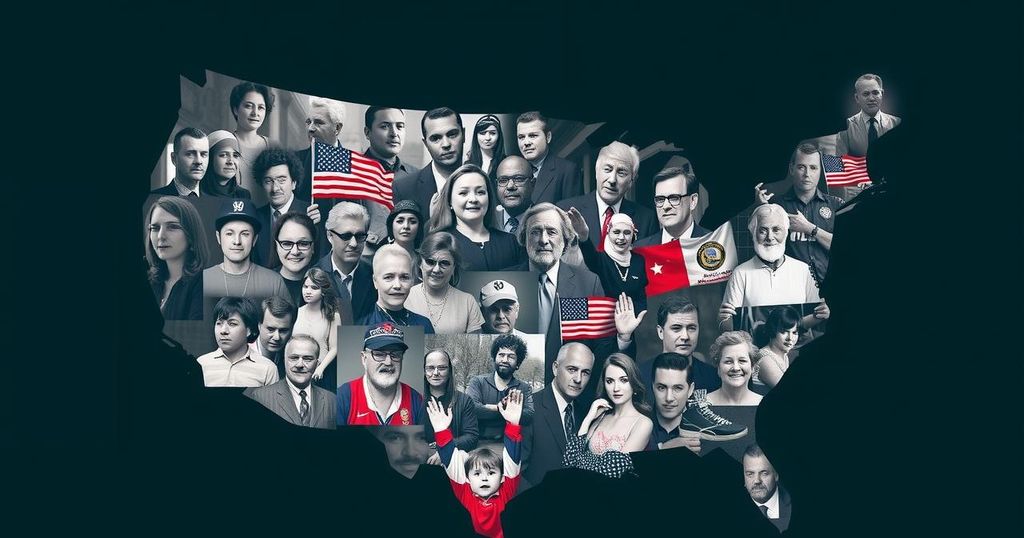The article contends that American democracy is a deteriorating myth that misrepresents electoral choices, particularly for Arab and Muslim Americans, who face systemic injustices both domestically and internationally. It critiques the complicity of both major parties in endorsing harmful policies towards Palestinians and advocates for voters to reject false choices and prioritize moral integrity over political expediency. The call to action emphasizes the importance of asserting one’s values and standing in solidarity with oppressed communities.
In contemporary America, the concept of democracy is increasingly perceived as a disintegrating myth, one that obscures the stark realities of political manipulation and complicity in systemic injustices. The forthcoming presidential election is billed with undue urgency, echoing past elections framed within a narrative of profound consequence. Yet, those familiar with American history recognize this binary choice perpetuated by the political elite, where both major parties align on essential issues, particularly regarding foreign policy, which has devastating implications for marginalized communities abroad, particularly Palestinian populations. American elections often create a facade of choice, suggesting profound ideological divides between the Democratic and Republican parties. However, these parties function more like two branches of the same exploitative tree, particularly in their unyielding support for policies contributing to violence against the Palestinian people. The complicity of leaders like President Joe Biden and Vice President Kamala Harris in endorsing the actions of the Israeli government raises serious moral questions, as they evade the term “genocide,” despite the overwhelming evidence of humanitarian atrocities. As disenchanted voters ponder their options in this politically charged atmosphere, Arab and Muslim Americans are left grappling with the implications of their electoral choices. The Democratic establishment, anxious about losing crucial support in fundamental states, has resorted to insincere outreach efforts aimed at placating communities that have been systematically marginalized and politically ignored. The rhetoric from Democratic leaders often rings hollow, utilizing disingenuous peace overtures as political strategies rather than genuine commitments to justice. In this precarious context, the advice to Arab and Muslim Americans is crucial: maintain your integrity and reject the false dichotomy presented by the political class. Voting for either major party may inadvertently endorse the very system contributing to international oppression and domestic marginalization. The notion that protesting against the Democratic candidate through an alternative vote could lead to the election of a more authoritarian figure should not compel participation in an unjust system. It is imperative to recognize that electing a candidate from either major party tacitly affirms oppressive policies. Active engagement in the electoral process should not compromise the fundamental values of justice and humanity. Voters must prioritize their moral stances and the community’s collective voice rather than succumb to pressures from political figures who have historically dismissed their worth and agency. Choosing to remain uncommitted signals a rejection of complicity, a demand for systemic change, and an insistence upon recognizing Palestinian lives as valuable and deserving of protection. Ultimately, the 2024 presidential election should not be viewed through a lens of fear but rather as an opportunity to assert one’s values and translate them into action. Each voter holds the power to challenge the status quo and assert their agency amidst a political landscape that frequently overlooks their plight. The urgency lies not in choosing between flawed candidates but in advocating for a politics that genuinely reflects the desire for equity and justice across all communities, with a focus on the inalienable rights of the Palestinian people to live free from violence and oppression.
This article critiques the prevailing narrative surrounding American democracy, particularly in the context of electoral politics. It addresses the systemic issues faced by Arab and Muslim Americans during an election cycle that many feel lacks genuine representation and advocates for the recognition of Palestinian suffering amidst a politically fraught environment. The piece underscores the complicity of both leading political parties in perpetuating injustices abroad and ignores the voices of marginalized populations, calling for a reconsideration of electoral engagement that prioritizes moral integrity over party loyalty.
In conclusion, the current state of American democracy is depicted as a deteriorating myth that obscures the troubling realities of political complicity and systemic injustice. Arab and Muslim Americans are urged to reject the false dichotomy of electoral choices that endorse harmful policies and instead assert their values by remaining uncommitted to ineffective political leadership. A call to action emphasizes the need for moral courage, community solidarity, and advocacy for the rights of Palestinian people, reinforcing the idea that meaningful change requires a deviation from established norms and the courage to confront power structures that prioritize political expediency over ethical responsibility.
Original Source: www.aljazeera.com







